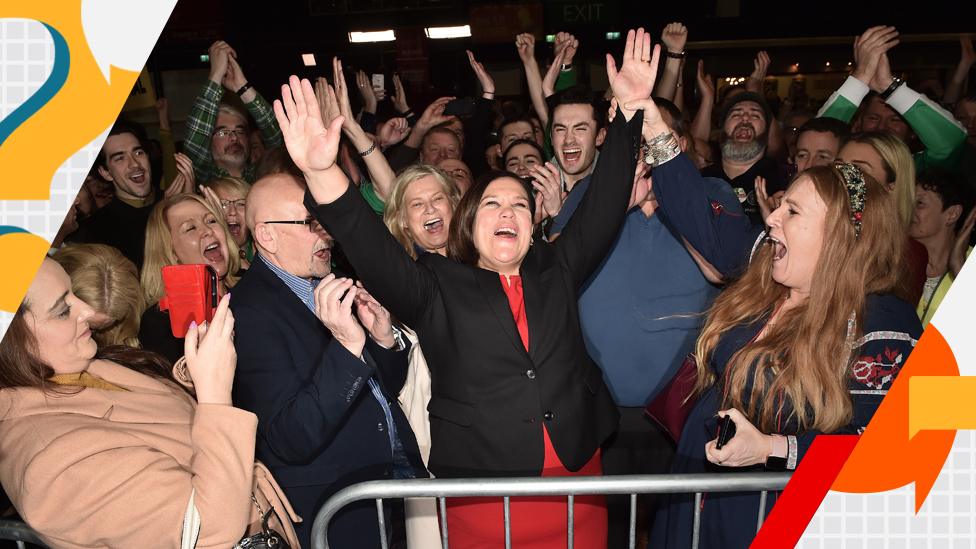Irish election: Recalling when the Dáil was a Sinn Féin 'cold house'
- Published
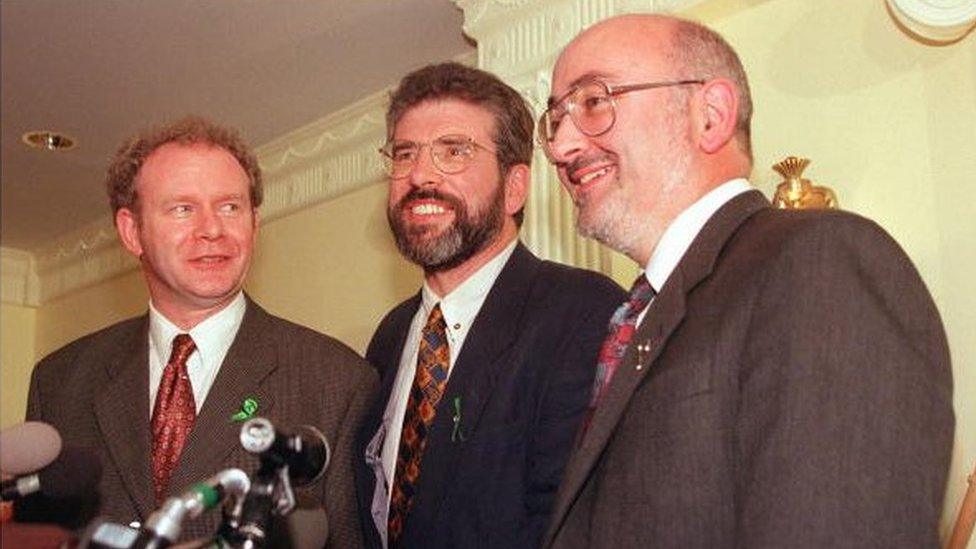
Caoimhghín Ó Caoláin (right) with Martin McGuinness and Gerry Adams
When the Dáil next sits it will be a very different place to the one Caoimhghín Ó Caoláin entered in 1997.
He was the first Sinn Féin TD elected to the lower house of the Irish parliament since 1957 and, as such, was a lone voice in an often hostile chamber.
The veteran republican recalls "lots of abuse", but he added that "such outbursts said more about those who resorted to such behaviour than it did about me and the party I have been proud to represent".
After quitting a career in the Bank of Ireland in the 1970s to focus on politics, Mr Ó Caoláin soon found himself at the centre of the Anti H-Block campaign of 1981, external.
As its director of elections, he saw hunger striker Kieran Doherty win a seat as a TD for the Cavan-Monaghan constituency, less than eight weeks before he died.
Despite being elected to Monaghan County Council in 1985, the Monaghan-born politician felt his political ambitions were being thwarted by Section 31 of the Republic of Ireland's Broadcasting Act.
It was forbidden to broadcast interviews, or reports of interviews or statements, by anyone speaking on behalf of a number of organisations, the most prominent of which was Sinn Féin.
The aim of the ban was to stop Sinn Féin getting its message across on television and radio during the Troubles.
For many years the party was the political wing of the IRA and supported the group's violent campaign aimed at bringing about a united Ireland.
The ban came to an end in 1994 and Mr Ó Caoláin said that meant he was able to contest the 1997 election on "a level playing pitch".
"People, for the first time, could hear us debate on the airwaves and could make an informed judgement on our policy platform," he said.
"The Cavan-Monaghan first preference vote for Sinn Féin rose by 7,000 to 11,500."
'A job to do'
While Sinn Féin's success was small, the shock was not, and Mr Ó Caoláin sees the same big beasts of Fianna Fáil and Fine Gael reeling again following the 2020 electoral surge.
"There was a sense of shock at the arrival of Sinn Féin into the bear pit of electoral politics in this state," he said.
"I was there to represent the electorate of Cavan-Monaghan but also, as the sole Sinn Féin TD over that five-year Dáil term, to represent the republican analysis on behalf of republicans the length and breadth of Ireland.
"It was a cold house for Sinn Féin.
"I had one support staff - Mícheál Mac Donncha, later Dublin City councillor and also mayor of Dublin.
"Despite the hostility, we just got on with it. We had a job to do."
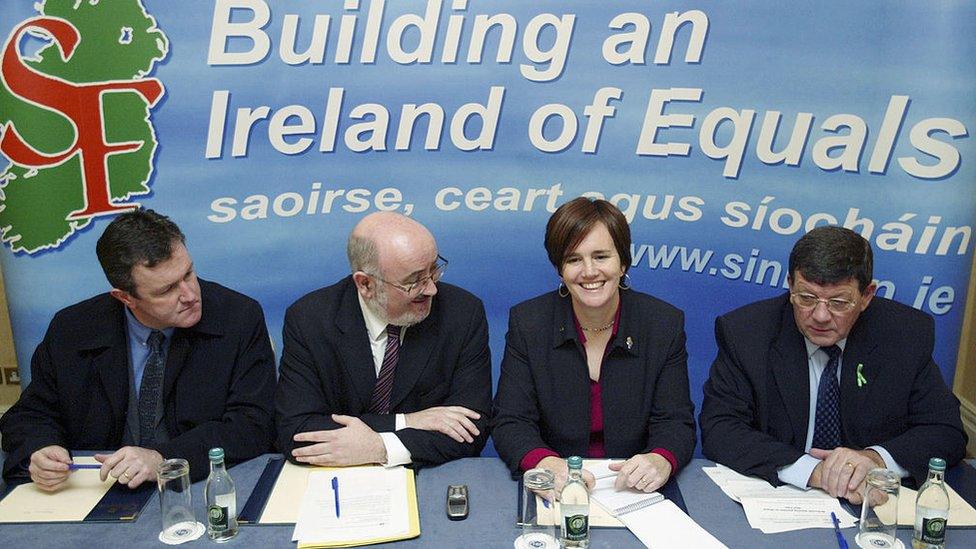
Caoimhghín Ó Caoláin (second left) with Conor Murphy, Caitriona Ruane and Pat Doherty in 2003
But as the years passed, the TD saw a thawing of relations as members of the different parties "got to know us a little better".
"They had the chance to listen to and evaluate the arguments we were putting forward, spent time working with us in the committee system and in the campaigns we were involved in.
"The traditional hostility softened."
In 2002, the lone voice was joined by four others from Sinn Féin, increasing to 14 TDs in 2011 and 23 in 2016.
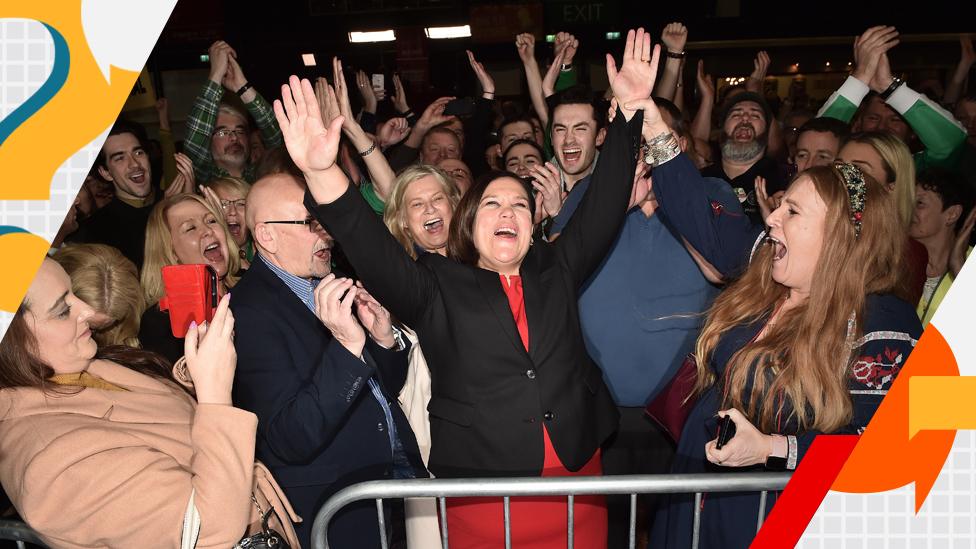
Mary Lou McDonald's Sinn Féin won the popular vote
But what does the veteran republican put the latest and most significant vote surge down to?
"People have had enough," he said.
"They want an end to the sham contest between Tweedledee and Tweedledum recognising there is not a hair's breadth between them on any issue.
"Clearly, they [Fianna Fáil and Fine Gael] are in disarray.
"The only logical thing for them to do is to set aside their empty rhetoric and, if it is too soon for them to amalgamate, then to forge a coalition in tandem with one of the smaller parties and get on with it."
A single regret
Two years ago, Caoimhghín Ó Caoláin announced that he would not contest the next general election.
His first post-retirement job was to "cull the 23 years of accumulated paper that has dominated my office".
He said his "only regret" is that he "did not have the chance to serve in a Sinn Féin-led government".
"I would very much have liked to have taken on the challenge of a portfolio.
"My great interest has been in health and I would not have baulked at the prospect of it, were it put to me.
"That said, I am of my time. It was not to be. But it will certainly fall to others after me to take on these responsibilities.
"I have great confidence in the capacity of my elected colleagues, including our newly elected TDs, to step up to the plate and to deliver."
- Published13 February 2020
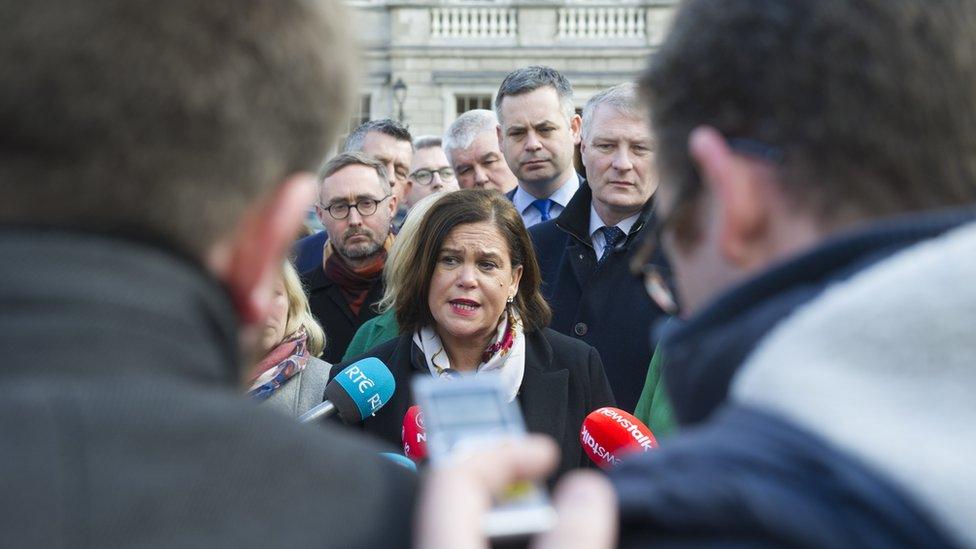
- Published14 February 2020
